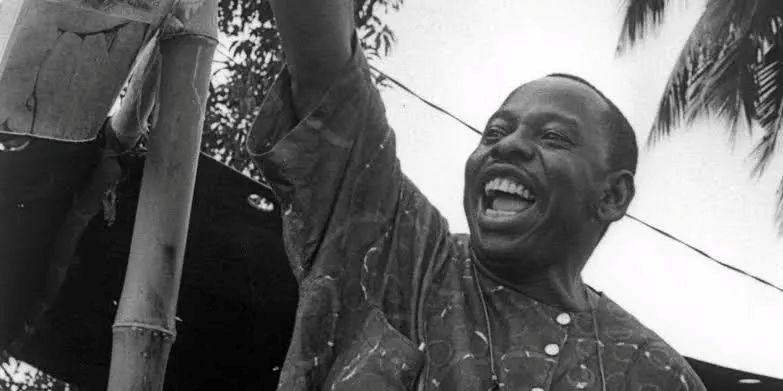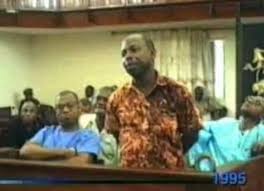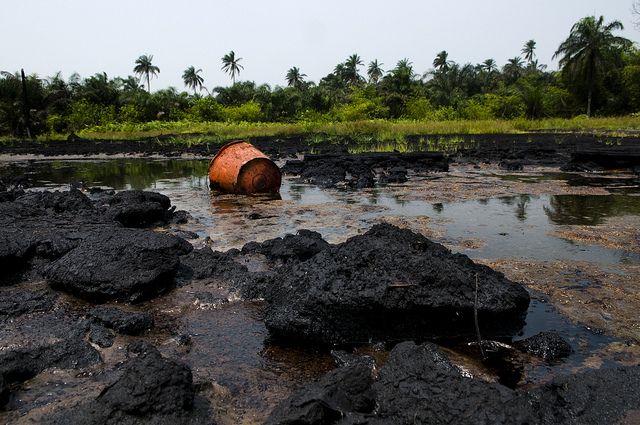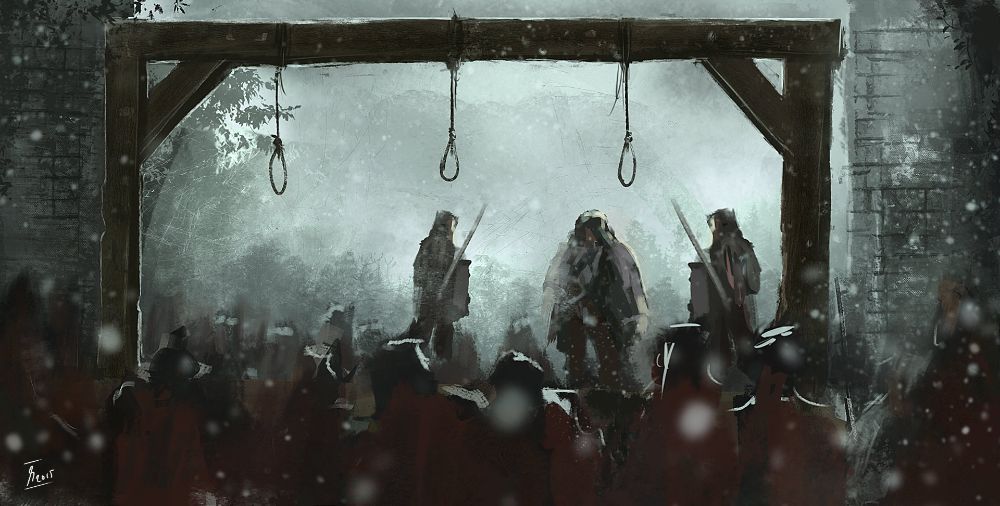On November 10, 1995, an event occurred that had a profound impact on the environmental activism movement in Nigeria. Nine activists, including Ken Saro-Wiwa, were executed by the then-military government led by General Sani Abacha.
Their crime?
Demanding that the Nigerian government and the oil company, Shell, clean up the Ogoniland damaged by oil. The oil-soaked land had made it hard for the Ogoni people to farm and fish, thereby affecting their livelihood.
However, what the government and oil companies failed to consider was the people who paid the price for it: those living in the region known as the Niger Delta.
This article looks back at the moment the Nigerian government silenced the “Ogoni Nine,” particularly one of its most prominent voices, Ken Saro-Wiwa. We’ll also discuss how Saro-Wiwa’s fight for the Niger Delta shaped global conversations on environmental justice and African activism.
The World Ken Saro-Wiwa Lived In
To fully understand the fight of Ken Saro-Wiwa and his fellow Ogoni activists, we must examine the world in which they lived. In the 1980s, Nigeria was one of the wealthiest nations in Africa, mainly due to its substantial crude oil reserves.
However, what the government and oil companies failed to consider was the people who paid the price for it: those living in the region known as the Niger Delta. The Ogoni people, from whom Saro-Wiwa comes, were among those affected.

Their lands, rivers, and air were affected by crude pollution. It was an environmental pollution crisis caused by oil extraction with very few safeguards. Pollution was the daily reality for Ogoniland residents, and the government and oil companies seemed unconcerned.
The pollution occurred in two significant ways:
- Pervasive Oil Spills: Between 1976, the period of the oil boom, and 1996, the Ogoni region experienced an estimated 4,835 oil spill incidents, as detailed in the UN Development Programme report. This was one of the worst periods in Nigeria’s environmental history as the pollution blackened rivers and creeks, the primary source of food and income for generations of the Ogoni people.
- Continuous Gas Flares: Aside from the spillage, the region also experienced continuous gas flares. In the 1990s, Nigeria was flaring over 76% of the natural gas from the oil extraction. These flares pose an environmental hazard as they release pollutants, such as benzene, into the air. This, in turn, causes what is known as acid rain. Acid rain corrodes metal roofs and can lead to respiratory problems and skin ailments.
While all this was happening, the Nigerian government profited immensely. According to a ResearchGate report, since the 1970s, crude oil has accounted for over 90% of Nigeria’s export earnings. A significant portion of the money realized was allocated to government revenue. Shell Nigeria, the primary operator in Ogoniland, was not left out.
The company reported profits in hundreds of millions of dollars from its operations in Nigeria. However, Ken Saro-Wiwa’s homeland did not benefit from any of the wealth. All they had to show for their oil-rich land was the pollution that ruined their rivers and farms.
Ogoniland was left without access to basic amenities, including clean drinking water, electricity, and functioning schools. It was because of this injustice that Saro-Wiwa and his fellow activists advocated for a better life for the Ogoni people. A movement that, though non-violent, cost them their freedom and life.
Ken Saro-Wiwa: The Writer Turned Revolutionary
Before Ken Saro-Wiwa became a globally recognized activist, he was a teacher, a government administrator, and a successful businessman. But above all, he was a writer. Saro-Wiwa was a literary talent, and by the late 1980s, he was a household name for his satirical TV show, Basi and Company.
The show was watched by an estimated 30 million Nigerians and satirized the corruption in Nigeria and the “get rich quick” mentality prevalent among Nigerians at the time. As a result, the show brought him fame way before his activism did.
So, with the fame he had, the life he led, and his wealth, why choose activism in a time of military rule where free speech was an illusion? Ken Saro-Wiwa realized that he could no longer rely solely on satire to express the country’s ills. He saw the extent of the Nigerian oil pollution in Ogoniland and felt compelled to take action.
MOSOP did not ask for succession, but the military government still saw the Bill of Rights as a direct challenge to their power and was determined to silence the activists.
Thus, idealism met with moral courage, and in 1990, Saro-Wiwa co-founded the Movement for the Survival of the Ogoni People (MOSOP). However, it was not an armed group, but a gathering of intellectuals who sought to use words to advocate for the benefits and livelihood of the Ogoni people.
Ken Saro-Wiwa, co-founder of MOSOP, Dr. Garrick Barile Leton, and other leaders co-authored the Ogoni Bill of Rights. The document contained requests for political autonomy for the Ogoni people, allowing them to manage their own affairs.
The document also contained requests for a fair share of the oil revenue from Ogoniland to be allocated to the people, as well as for environmental protection and the cleanup of their land. MOSOP did not ask for succession, but the military government still saw the Bill of Rights as a direct challenge to their power and was determined to silence the activists.
The Clash Between the Activists and the Military Government
MOSOP organized several protests to compel the government to meet its demands. By 1993, their peaceful protests had garnered global attention, causing Shell Nigeria to suspend its operations in Ogoniland. However, the government saw it as a direct rebellion, and from then on, there were only two possible outcomes.
The Arrest
In May 1994, the government found an opportunity to arrest Ken Saro-Wiwa and other MOSOP members. That month, four prominent Ogoni chiefs who were anti-MOSOP were killed by a mob. The government then arrested Saro-Wiwa and the other eight MOSOP members on charges of inciting the murders.
According to historical records, Saro-Wiwa had been barred by the military from entering Ogoniland the day the chiefs were killed, and was nowhere near the scene. But this did not stop the military from arresting him. The chiefs’ death was the perfect excuse the Abacha-led government needed to turn Saro-Wiwa from a non-violent environmental activist to a criminal.
The Trial
What followed is what many historians have described as a legal facade. The government established a special military court, the Rivers State Civil Disturbances Special Tribunal, for the trial, rather than sending them to a civilian court.

International observers and human rights groups condemned the action, calling it a show branded as justice. Saro-Wiwa and MOSOP members’ defense lawyers quit because of blatant judicial interference, intimidation, and the inability to present evidence.
However, key prosecution witnesses later recanted, stating the government bribed them with money and offers of a job at Shell to incriminate the nine men. But at the time they did this, the verdict was already determined. The tribunal sentenced the nine men to death, and while addressing the military judges, Ken Saro-Wiwa uttered these words that have never been forgotten: “We all stand before history.”
The 1995 Execution and the Legacy of the Ogoni Nine
The verdict was delivered on October 31, 1995, and what followed was a series of international appeals from figures like Nelson Mandela, Pope John Paul, and the Commonwealth. However, the military government was not moved by the appeals and fixed the execution of Ken Saro-Wiwa and the other defendants for November 10, 1995.
The Ogoni nine were hanged in Port-Harcourt on that day, and it was met with international outrage. The Commonwealth suspended Nigeria for human rights violations, and Shell came under intense and sustained global scrutiny.
The report revealed that the contamination was so severe that drinking water was poisoned and the soil saturated with hydrocarbons. A proper cleanup of the land will take 30 years.
The execution set back environmental activism in Nigeria, as MOSOP lost its leaders, leaving the organization fractured. However, while the government might have severed ties with MOSOP, it could not erase the legacy of Saro-Wiwa and his comrades.
The Legacy of the Ogoni Nine
Instead, their story became the match that lit the fire, inspiring a new generation of environmental activists in Nigeria and across Africa. The fight for environmental protection was now linked to the struggle for human rights.

The fight continued for decades, and in 2009, after a long-fought case in a United States court, Shell agreed to a $15.5 million settlement for the families of Saro-Wiwa and the other executed activists. Although Shell refused to admit its guilt or liability, many still saw it as a win.
In 2011, the UN Environment Programme (UNEP) released a report detailing the devastating scale of the pollution in Ogoniland. The report revealed that the contamination was so severe that drinking water was poisoned and the soil saturated with hydrocarbons. A proper cleanup of the land will take 30 years.
The Niger Delta remains one of the most polluted places on earth: the water is still slick with oil, and the air is toxic. The justice for the Ogoni people that Ken Saro-Wiwa and the other MOSOP members fought for remains elusive, but aluta continua (the struggle continues).
Final Thoughts
Since the death of Ken Saro-Wiwa and the MOSOP members, many more people have taken up the mantle to fight for the rights of the people of the Niger Delta and protect their land from pollution. And globally, environmental activists are demanding greater accountability from those who harm the environment and the lives of people, a stance that Saro-Wiwa would undoubtedly be proud of.
In 2025, Nigerian President Asiwaju Bola Ahmed Tinubu issued presidential pardons to the Ogoni Nine and posthumously conferred the national honor of Commander of the Order of the Niger (CON) on Ken Saro-Wiwa.
References and Further Reading:
- BBC ON THIS DAY | 10 | 1995: Nigeria Hangs Human Rights Activists
- A Month and a Day: A Detention Diary
- Effect of Gas Flaring on Soil and Cassava Productivity in Ebedei, Ukwuani Local Government Area, Delta State, Nigeria
- EIA Report on Nigeria
- OGONI BILL OF RIGHTS
- NIGERIA THE OGONI CRISIS: A Case-Study Of Military Repression In Southeastern Nigeria
- Trial Speech of Ken Saro-Wiwa – Wikisource, the Free Online Library
- Shell Settlement With Ogoni People Stops Short of Full Justice


